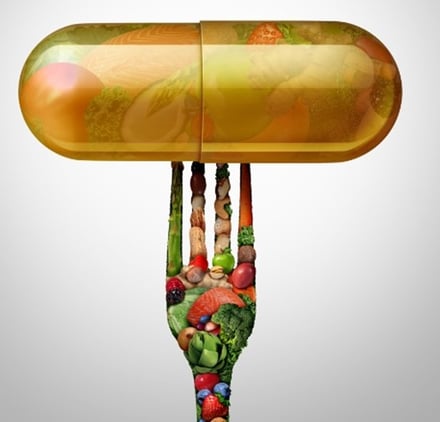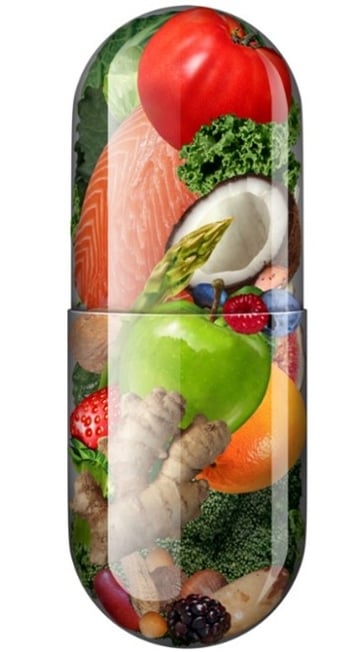The food-as-medicine movement has been around for decades, but it's making inroads as physicians and medical institutions make food a formal part of treatment, rather than relying solely on medications.1 By prescribing nutritional changes or launching programs such as "Shop with Your Doc," they are working to prevent, limit or even reverse disease by changing what patients eat. And the time seems right for such programs.
 The estimated annual medical cost of obesity in the United States was nearly $173 billion in 2019. 2 Medical costs for adults who had obesity were $1,861 higher than medical costs for people with healthy weight.
The estimated annual medical cost of obesity in the United States was nearly $173 billion in 2019. 2 Medical costs for adults who had obesity were $1,861 higher than medical costs for people with healthy weight.
Perhaps not surprisingly, successful examples from the “food as medicine” movement come from chronic disorders, specifically obesity, cardiovascular disease, diabetes type 2 and its comorbidities.3 However, the list of other diseases for which there is evidence suggesting that healthy nutrition can reduce disease burden or progression includes depression, osteoarthritis, functional bowel diseases and multiple sclerosis.
In addition, research has shown that a diet rich in added sugars, saturated and trans fats and excess sodium may induce chronic inflammation — an underlying risk factor in the development of heart disease, type 2 diabetes, poor gut health and other chronic diseases.4
Sound Choices
Just as poor food choices can adversely affect health over time, sound choices can have the opposite effect.
The American Heart Association5 says that a healthy diet and lifestyle are the keys to preventing and managing cardiovascular disease, and recommends an overall healthy dietary pattern that emphasizes:
- A wide variety of fruits and vegetables.
- Whole grains and products made up mostly of whole grains.
- Healthy sources of protein (mostly plants such as legumes and nuts, fish and seafood; low-fat or nonfat dairy; and, if you eat meat and poultry, ensuring it is lean and unprocessed).
- Liquid non-tropical vegetable oils.
- Minimally processed foods.
- Minimized intake of added sugars.
- Foods prepared with little or no salt.
- Limited or preferably no alcohol intake.
Experts believe this diet supports good health by reducing harmful risk factors of cardiovascular disease, including inflammation, elevated cholesterol, high blood pressure and poor sleep.4 Research also shows that carotenoids — antioxidants naturally found in some vegetables and fruits — in the diet can improve the blood metabolites of people with liver disease.
The World Health Organization (WHO) links better nutrition to improved infant, child and maternal health, stronger immune systems, safer pregnancy and childbirth, lower risk of non-communicable diseases (such as diabetes and cardiovascular disease), and longevity.6
Interest in food as medicine among healthcare professionals and educators is on the upswing:
- Nutrition education in the first three (pre-clinical) years of the UCL undergraduate medical (MBBS) curriculum in London includes nutritional science and public health nutrition.7 The aims of the course are to equip students with the knowledge and skills to recognize patients whose health and wellbeing may be improved through dietary modification, and to be able to provide basic dietary advice.
- Over 60 academic medical centers across the United States use the Health meets Food curriculum, which was developed to change the dialogue between healthcare professionals and their patients about food and health.8
- In Southern California, Loma Linda University School of Medicine offers specialized training for its resident physicians in Lifestyle Medicine — a formal subspecialty designed to train doctors how to prevent and treat disease, in part, by changing patients' nutritional habits.1 The medical center and school at Loma Linda also has a food pantry and kitchen for patients.
Limitations of Food as Medicine
Healthcare experts agree that diet alone isn’t always the solution, or that every illness can improve substantially from dietary changes.1
The development of chronic diseases continues to be complex and may be attributed to non-diet-related causes, including genetic risk, exposure to environmental toxins or autoimmune conditions.4 Thus, while “food as medicine” may support disease management by improving symptoms and slowing disease progression in some diseases, it must not be used as a stand-alone treatment, but rather, in conjunction with appropriate medical therapy.
Pharmacologists and clinicians are increasingly realizing that a ‘one disease -- one target – one drug’ approach has limitations where it concerns the multifactorial diseases that are dominating our era.3 Research in nutrition and lifestyle physiology is instrumental in generating new insights in relation to pharmacological modulation. These developments demand more interdisciplinary interaction between nutritional, or lifestyle, biology, and pharmacology, in order to increase understanding of the earliest events taking place in the etiology of disorders typical for our current society.
The bottom line may very well be that the best “medicine” is balance in our lives — with regard to food, movement, sleep, stress and substances.9 This calls for nurturing social connections, having access to preventive health care, living in a safe and walkable neighborhood, enjoying freedom from oppression and, yes, eating well.
SEKISUI Diagnostics’ next blog will explore how advocates of “food is medicine” are bringing the concept out of the textbook and into the homes of people with chronic and other diseases.
References
- Food As Medicine: It’s Not Just a Fringe Idea Anymore, NPR
- Adult Obesity Facts, CDC
- Let thy food be thy medicine ... when possible, European Journal of Pharmacology
- Can food be medicine? Pros and cons, Medical News Today
- The American Heart Association Diet and Lifestyle Recommendations, American Heart Association
- Nutrition, World Health Organization
- UCL Medical School Leading the UK Culinary Medicine Teaching Movement, UCL
- Culinary Medicine Program, Culinary Medicine.org
- Is it correct to think of food as medicine? Not exactly, The Seattle Times



Share Article